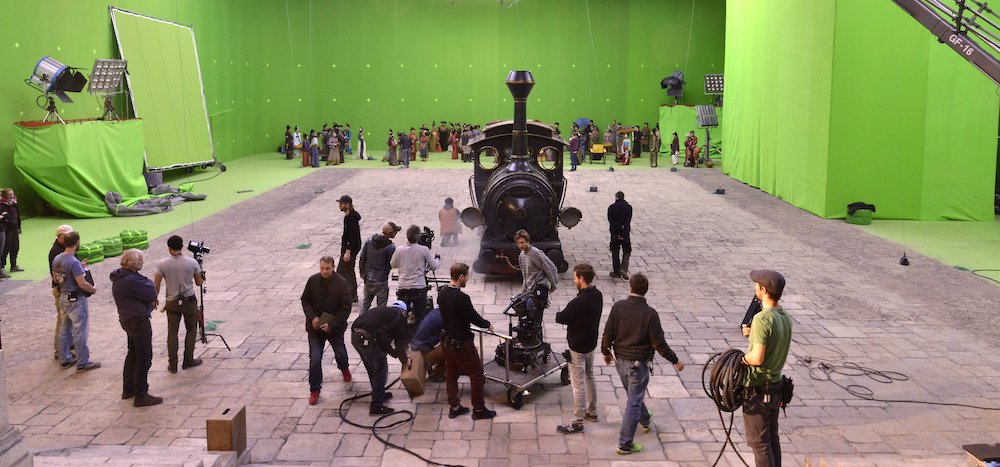(Editor’s note: This Berlin work diary entry is Pt. 2 of his post about auditioning for a Netflix project at Babelsberg Studio in Berlin. You can see Pt. 1 here. It’s also the fifth installment in Chris Loar’s ongoing series. See his first post here; his second here , his third installment here and the fourth here. )
“Don‘t worry about the text at all,” the Assistant Director told me as I entered the tiny audition room. “We‘re just going to improvise the scene, okay?” With a relaxing inhale, I let go of whatever desire I had to show the casting department my studied Aussprache and just how dedicated I was to knocking this possibly German language role out of the park.
I stepped in front of the camera and the AD broke the scene down into clear actions and an easy beginning, middle and end.
A long audition … that’s good, right?
The main action of this scene was that during a violent shipwreck aboard an international voyage, a group of mutineers (led by me) take over the upper class passengers quarters and steal their fancy stuff. We had just broken into a fancy person‘s room, and I was asserting my dominance. In the scene I had a rifle, which I was told to pantomime. This seemed like a simple enough scene, so when the AD called action I enjoyed strolling into make-believe time; it had been a long time since my last audition and it felt good to be in the room.

What I thought might be a five-to-10 minute tryout at the fabled Babelsberg Studio in Berlin turned into perhaps the single longest first audition I‘ve ever been on in my life.
I did the scene; it went pretty good. Then, I was given tiny adjustments of who to threaten and how; of how I might block the door; of how much it might please me to possibly take one of these passengers hostage and when; of where I would keep the valuables I stole from their room; of whether I would share these goods with my fellow lower class passengers; of how much of a hurry I was in and exactly when I would move fast and when I would enjoy taking my time – this seemed less and less like a first call and more like a callback workshop.
When we finished, I realized I had been in the room for more than 20 minutes. “This must mean they like me!” I thought. “If they are willing to work with me this much, they really want to see what I can do! Oh, wouldn‘t it be great if I got it? Ohhhhhhhhh please please please please please!”
The midday sun wrapped around my face as I smiled into the rest of the day. I chuckled as I considered how similar the scene was to a pivotal moment in the film “Captain Phillips.” I found contentment in waiting over the next few days and genuinely believed that even if I didn‘t get it, I wouldn’t be disappointed. All of this started by just getting some background work simply to earn money, this additional opportunity was completely unexpected and nothing to set my heart on.
Oh, yeah … this is Germany, not New York
Despite all the usual platitudes of not caring about getting a part or not, when I got the news three days later that casting went with someone else, it stung. It was okay though; it was a sting I knew from before and I would still get to work as an extra and experience two full days on a truly spectacular set with a world class production team. I also got to wear a truly silly costume with an enormous fake mustache and carry a very heavy rifle.
There were worse ways to make rent.
During shooting, I got to chatting with my fellow pretend third-class passengers, one of whom we’ll call Johannes. I got the feeling that Johannes had been a little more friendly with the director and cast than the rest of us, like he knew them in some closer way. I observed them chatting sometimes about where he would end up in a shot, on what side of what main character and in what spatial relation to the camera.
Then it hit me: this was the guy who got the part. This was the mutineer who, by way of a successful audition, had moved up in the ranks from third class passenger (background actor) to upper class voyager (speaking role.)
The metaphysical dimension of class structures as it played out both in the real life film industry and this imaginary shipwreck series was not lost on me as I sat with Johannes at lunch eating some actually quite good vegan curry. All day long we had been shooting a short scene where we ran around a corner and confronted a group of passengers with rifles.
As we did the scene again and again, it occurred to me that in this entirely European, multi-language series, the presence of an American accent would be completely ridiculous; it would stick out terribly in this very serious-toned show.
Johannes and I got to talking and in a stereotypically German way he shut down all chances for comfy American-style small talk with a probing question: “So Chris, Why did you choose to come to Berlin?” I was about to respond when he continued, “Or perhaps, you did not choose. I am in Berlin only because my ex-wife is in Berlin, and we have two children together, and she must be in Berlin, and to see my children, I too must be in Berlin. So you can see: I did not choose.”
His words hung heavily in the air. I replied, “I don‘t know man, I just always kinda wanted to live here. I’m gonna go see if they have bagels, do you want a bagel, dude?”

About the author:
Chris Loar is a comedian and artist living in Berlin. He was born in Torrance, California and called Brooklyn, New York home for 16 years before moving to Germany in 2020. A multi-hyphenate creator, Chris is also a passionate movie maker, Yoga teacher and cocktail bartender.
Follow him on Instagram at chrisloarcomedy
See more of Chris’s Berlin work diary here.
Read more on Dispatches’ Berlin archive here.














